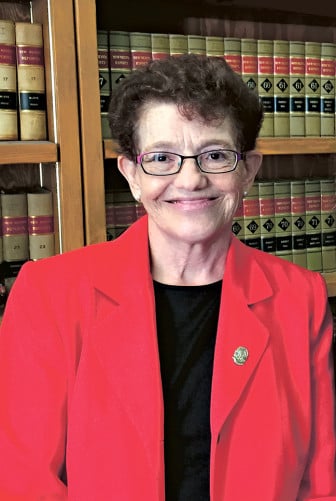
Jennifer Padgett
Santa Fe has become the latest American city where prosecutors’ handling of police shooting cases will at least in part define the battle in a district attorney’s race.
As officer shootings have come under increasing scrutiny around New Mexico and across the nation, so, too has the role of prosecutors in determining whether police acted lawfully.
Last month, Chicago’s top prosecutor was ousted by her primary opponent amid public outcry that she had moved too slowly to prosecute an officer who fatally shot an unarmed black man named Laquan McDonald. The county prosecutor in Cleveland met a similar fate in his primary race after no charges were filed against the officer who shot and killed Tamir Rice, a 12-year-old black boy.
Now, police shooting reviews have emerged as the signature campaign issue as three candidates vie for the Democratic Party’s nomination to lead the 1st Judicial District Attorney’s Office, which comprises Santa Fe, Los Alamos and Rio Arriba counties. The primary election is June 7, and in the Democratic-leaning district, the winner will carry a marked advantage into November’s general election against Republican Yvonne Chicoine.
The debate began after a story published last month by SFR and New Mexico In Depth revealed the inner workings of “investigative grand juries,” which Santa Fe prosecutors have used for more than a decade to review police shooting cases. Unlike traditional grand juries, the panels were not given the authority to issue indictments and even when they concluded officers’ shootings were not justified, no criminal charges followed.

Angela Pacheco
Jennifer Padgett, whom Gov. Susana Martinez appointed late last year to replace retiring Santa Fe DA Angela “Spence” Pacheco, told SFR and NMID for the March 23 story that she anticipated presenting one police shooting case to an investigative grand jury.
Her primary opponents quickly pounced. Marco Serna and Maria Sanchez-Gagne, both former prosecutors themselves, condemned the investigative grand jury presentations and said they would scrap them if elected.
Padgett worked to “get up to speed” on the issue, she said in an interview two weeks ago, and offered a series of shifting answers for how she would decide whether the three police shooting cases on her desk were justified.
At a candidate forum last week, the first question asked was about police shooting reviews. By then, Padgett had decided to end the practice of using investigative grand juries.
The issue highlights key philosophical differences among the three candidates.
Serna, 32, said he would appoint special prosecutors from outside the district for the cases. That’s because local district attorneys and the officers they depend on as witnesses in cases every day “are on the same team,” which presents a clear conflict of interest, Serna said in an interview.
“I want to avoid any conflicts, any potential for inappropriate activity,” said Serna, who has worked as a prosecutor in the 13th Judicial District Attorney’s Office and the Attorney General’s Office and is the son of former state insurance superintendent Eric Serna. “The public deserves independent investigations … People ask about this issue when I’m going door to door.”
Sanchez-Gagne, 55, disagreed. She said in an interview that deciding criminality in all cases — from shoplifting to police shootings—is the DA’s responsibility.
“I see this as a very clear issue. You’re not going to be popular for every decision you make.” said Sanchez Gagne, who prosecuted case for five years in the 1st Judicial DA’s Office and for 15 years in the AG’s Office.
Padgett, 39, said the issue is cloudier than either of her opponents have cast it. The former prosecutor in Santa Fe and Las Cruces and administrator in the state Children, Youth and Families department, said deciding how to handle police shooting cases is not just a theoretical, campaign issue.
“I have a job to do,” she said, pointing out that one of the three police shootings she’s currently reviewing has languished for more than a year and that’s ““just way too long.”
Still, she is aware of the climate—locally and nationally—surrounding the issue.
“If I make a decision before June 7, people are going to say I did it for headlines,” she said, adding that she is likely to use and internal office review to decide whether the April 2015 state police shooting of Ethan Noll was justified. “But there are people attached to these cases. There are lives lost and lives affected. I want to do this right.”

Jeanette Anaya
The March story was built largely around a transcript of then-DA Angela “Spence” Pacheco’s presentation to a grand jury in New Mexico State Police officer Oliver Wilson’s 2013 fatal shooting of 38-year-old Jeanette Anaya in suburban Santa Fe.
Pacheco relied heavily on the state police investigation of its own officer, the transcript showed. She did not explore discrepancies between video evidence of the shooting and Wilson’s statements. And even one of the grand jurors was confused by the process, asking the prosecutor what the purpose of the presentation was given that the grand jury had no target.
Teresa Anaya, Jeanette’s mother, is still pushing for criminal charges against Wilson. She has sharply criticized the investigative grand jury presentations and followed the DA’s race closely.
She met with Sanchez-Gagne last month and donated money to her campaign. .
“She didn’t promise me anything, but she did say that what happened—the whole thing, the whole system—was an injustice, and I really appreciated that,” Teresa Anaya said. Whoever is elected, “if they stick to that, if they do stop using the investigative grand juries, that will be a little bit of saying Jeanette’s death was not in vain. Just so no other family will have to go through quite what we did.”
